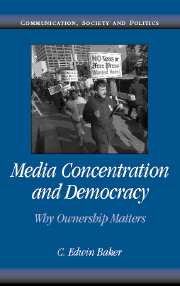Book contents
- Frontmatter
- Contents
- Preface
- Introduction
- 1 Democracy at the Crossroads: Why Ownership Matters
- 2 Not a Real Problem: Many Owners, Many Sources
- 3 Not a Real Problem: The Market or the Internet Will Provide
- 4 The First Amendment Guarantee of a Free Press: An Objection to Regulation?
- 5 Solutions and Responses
- Postscript: Policy Opportunism
- Notes
- Index
- Titles in the series
5 - Solutions and Responses
Published online by Cambridge University Press: 05 June 2012
- Frontmatter
- Contents
- Preface
- Introduction
- 1 Democracy at the Crossroads: Why Ownership Matters
- 2 Not a Real Problem: Many Owners, Many Sources
- 3 Not a Real Problem: The Market or the Internet Will Provide
- 4 The First Amendment Guarantee of a Free Press: An Objection to Regulation?
- 5 Solutions and Responses
- Postscript: Policy Opportunism
- Notes
- Index
- Titles in the series
Summary
It is now time to take stock. Chapter 1 provides three main reasons to favor maximum feasible dispersal of media ownership. This dispersal provides for a presumptively more egalitarian distribution of power within the public sphere, reflecting normative premises of democracy. Dispersal also provides various democratic safeguards – both safeguards against undemocratic, potentially demagogic abuse of power and safeguards in the form of likely better performance of the media's watchdog role. Finally, a major cause of media dysfunction reflects market incentives to focus maximally on the bottom line rather than on quality and media that people value. Structural economic theory and sociological theory, both reinforced with empirical evidence, suggest that media conglomerates, especially publicly traded media conglomerates, are more likely than other ownership patterns to exhibit this collectively dysfunctional profit-maximizing behavior. Chapters 2, 3, and 4 consider and reject counterarguments that assert that media concentration is not today a real problem or that restricting this concentration creates First Amendment objections. In response to this final point, however, chapter 4 emphasizes a theory of complex democracy that had been only marginally discussed in chapter 1. Complex democracy supports not only the argument of chapter 1 for maximum dispersal of ownership but also a reason to favor inclusive and presumptively larger media entities capable of supporting societal-wide discourses. With this background, which media policies related to ownership are best? That question is the subject of this chapter.
The first issue is identifying ideal ownership restrictions. Two initial observations should be made.
- Type
- Chapter
- Information
- Media Concentration and DemocracyWhy Ownership Matters, pp. 163 - 189Publisher: Cambridge University PressPrint publication year: 2006



